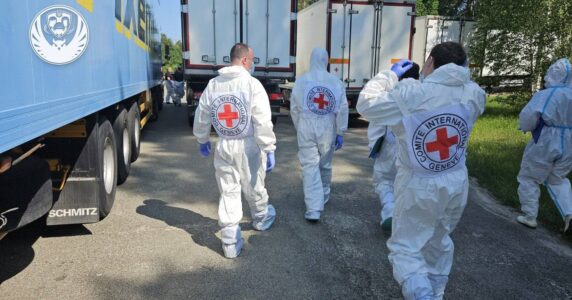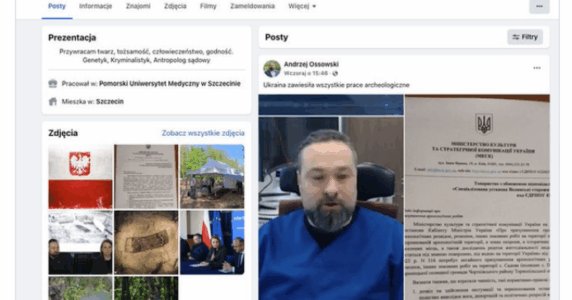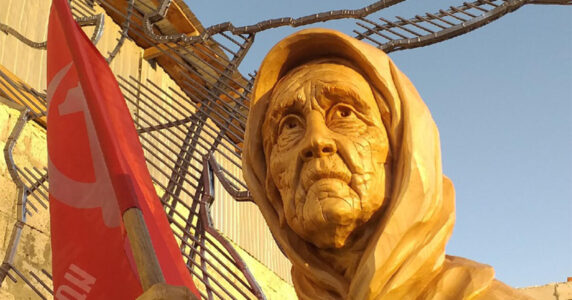Navigation and useful materials
June 22 marks the Day of Remembrance and Sorrow in Ukraine. In 2022, the symbolism of this holiday is more relevant for Ukraine than ever in the last 77 years.
The memorial date was chosen very precisely. On that summer day in 1941, Hitler’s Germany invaded the Soviet Union, launching one of the largest and bloodiest campaigns of World War II.
All of Ukraine became a great theatre of operations. The fronts swept its lands twice: from west to east and back. Our country did not declare war on anyone and was not an object of international relations at all, but nevertheless had one of the longest lists of World War II victims. In less than four years, that war claimed the lives of eight million Ukrainians, more than five million of whom were civilians.
The German-Soviet war was also the most devastating for Ukraine. Neither side reckoned with civilian casualties, and both resorted to scorched earth tactics. As a result, more than 700 towns and cities and more than 28,000 villages were destroyed.

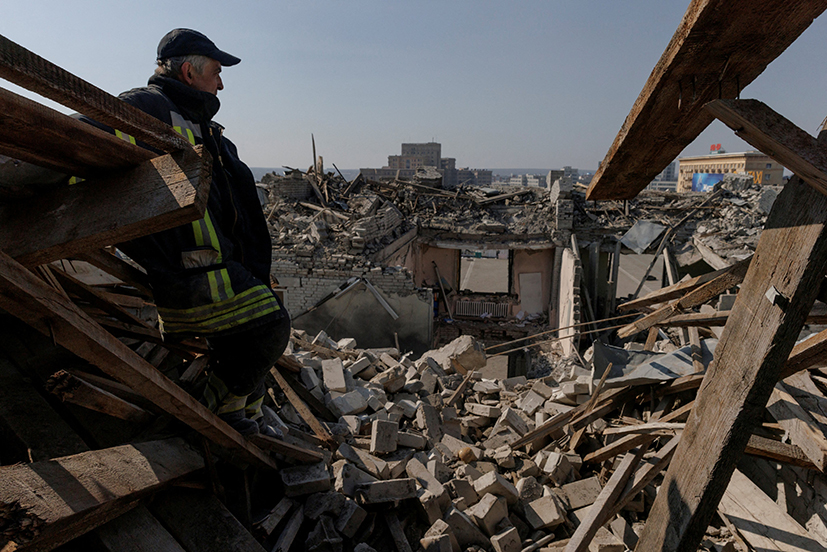
All of this is now causing a déjà vu effect. Starting with the old Soviet war song: “On June 22, at 4 a.m. sharp, Kyiv was bombed, and it was announced that the war had begun.” These words probably occurred to many Kyiv residents who woke up from bombing of the city with Russian missiles at about 4–5 a.m. on February 24, 2022. Since then, the sound of air-raid sirens has become a common attribute of Ukrainians’ lives. Many have already died: in their flats, on the street, hiding in shelters, or rescuing others.
Many direct witnesses of World War II, now old and grey, got the opportunity to relive and experience the horrors of war from the “brotherly people.” Unfortunately, not all of them were as lucky to survive as they were eighty years ago. This also applies to 96-year-old Borys Romanchenko, a Buchenwald prisoner killed by a Russian missile in Kharkiv. Romanchenko was vice president of the Buchenwald-Dora International Committee. The veteran could never imagine how close was the evil against which he warned the younger generations.

In some cases, the Russian Nazis not only imitated, but surpassed their historical predecessors. This is what happened in Mariupol. In two months of indiscriminate shelling, Russians killed twice as many Mariupol residents as the number killed in the two years of German occupation.
91-year-old Zhanna Obiedkova became a tragic symbol that united the two bloody wars in the city. In the midst of the Holocaust, she escaped the Nazis by hiding in the basements of Mariupol. And on April 4, 2022, she died in a basement in Mariupol from exhaustion and dehydration, hiding from Russian bombing.
Putin’s henchmen hide evidence of their crime against Mariupol the same way the Nazis did: near Mangush in mass graves. Like eighty years ago, the occupiers take Mariupol residents abroad, process them through filtration camps, and send them to concentration camps.
After Bucha, Irpin and Borodianka, it can already be said with certainty that the defence forces saved the capital of Ukraine from the recurrence of the horrors that Kyiv experienced during the German occupation: Babyn Yar, Syretskyi and Darnytskyi concentration camps.
World War II taught humanity a lesson: this is how mass hatred and hysteria cultivated by a criminal political regime can end. That is why the commemoration of another memorial date related to the global conflict, May 8 and 9, is held in Ukraine under the slogan “Never Again.” In modern Russia, however, they gave up on the Soviet “Just no more war” and said excitedly, “We can do it again!”
And they are doing it all again, indeed: the aggression, the crimes, the propaganda. As well as the ethics and even the aesthetics of Hitlerism. In the imperial chauvinistic exaltation, Ukraine’s neighbours did not notice how they became the Nazis their ancestors fought against.
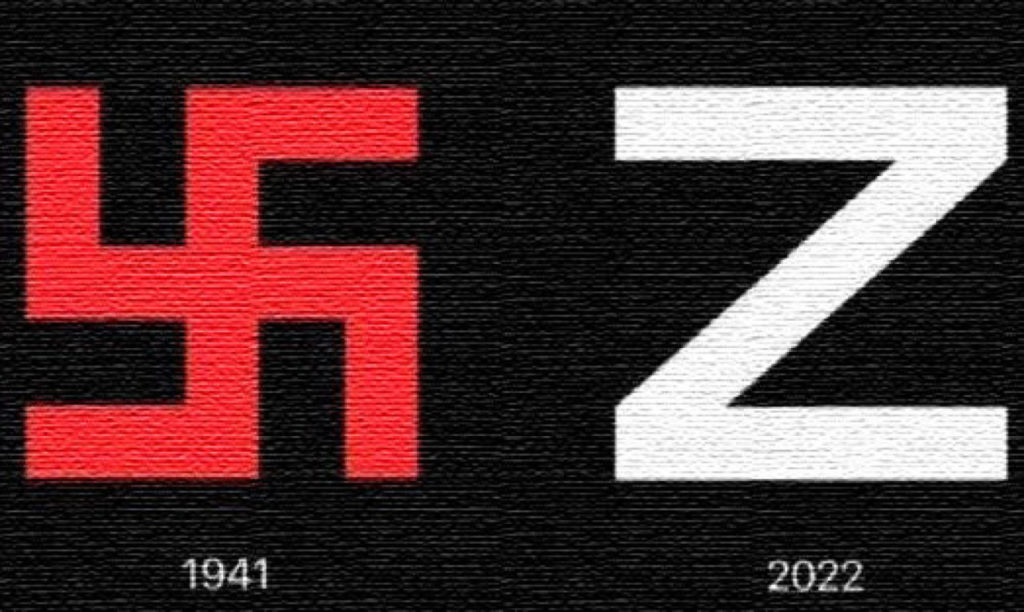
When Hitler started World War II, he justified his actions with words that are strikingly similar to those of Putin on the eve of the large-scale invasion of Ukraine. ArmyInform correspondent Serhii Lemekha aptly compared them in his article. As they say, find 10 differences.
- Hitler: It is a lie when the outside world says that we only tried to carry through our revisions by pressure. Putin: We are not going to force anything on anyone.
- Hitler: You know the endless attempts I made for a peaceful clarification and understanding of the problem of Austria, and later of the problem of the Sudetenland, Bohemia, and Moravia. It was all in vain. Putin: For long 8 years, we have done everything possible to resolve the situation by peaceful, political means. All in vain.
- Hitler: Germany has no interests in the West, and our western wall is for all time the frontier of the Reich on the west. Putin: Our plans do not include the occupation of Ukrainian territories.
- Hitler: As in other German territories of the East, all German minorities living there [in Poland] have been ill-treated in the most distressing manner. Putin: Its purpose [of the special operation] is to protect people who have been subjected to abuse and genocide by the Kyiv regime for 8 years.
- Hitler: Danzig was and is a German city. The Corridor was and is German. Putin: For us, Ukraine is not just a neighbouring country. It is an integral part of our own history, culture, spiritual space.
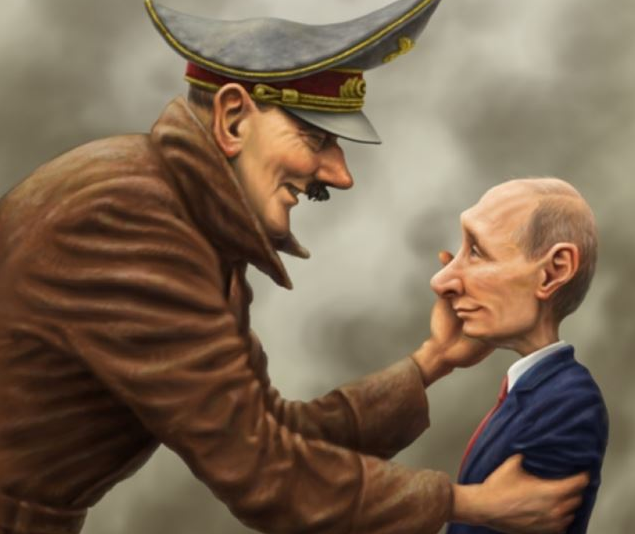
American historian Timothy Snyder argues that modern Russia already meets the basic criteria of a fascist state: “There is a cult around the only leader, Vladimir Putin. There is a cult of the dead, organized around the Second World War. And there is a myth about the past golden age of imperial greatness, which must be restored by war through healing violence — a deadly war against Ukraine.”
Here are some other similarities between Putinism and Hitlerism:
- Revanchism. Hitler tried to take revenge for Germany’s loss in World War I. Putin seems to be trying to rewrite the results of the Cold War, calling the collapse of the Soviet Union “the greatest geopolitical catastrophe of the twentieth century.”
- Land collection (irredentism). Hitler proclaimed that all Germans should live in one state. Putin is constantly worried about the Russian people divided by borders. This results in pressure and aggression against states where German / Russian minorities live.
- Pan-Germanism / Pan-Russianism. Hitler, like Putin, denies the right of ethnically related peoples to their own national existence. Hitler dreamed of a German world in which Austrians, Dutch, Danes, and Norwegians were to dissolve. Putin considers Russians, Ukrainians, and Belarusians to be one people divided by enemies.
- Imperialism. Hitler sought German dominance in Europe and demanded the conquest of “living space” in the east. Putin despises smaller states he considers “non-sovereign” and tries to negotiate “spheres of influence” in Europe with the United States.
- Nationalism and militarism. In both cases, we are dealing with the instillation of “patriotic feelings”, the introduction of relevant cults and rituals, the mad indoctrination of youth. The Russian “Yunarmy” is an almost exact copy of the German Hitlerjugend. In schools, teachers are forced to glorify the “special operation.”
- Search for enemies at home. Psychological mobilization of the population in the fascist state requires not only an external threat, but also the constant identification and exposure of “internal enemies.” To identify them, the Putin and Hitler regimes even use the identical concept: national traitors.
- Contempt for international law. Both regimes profess the principle that national interests justify violations of the principles of civilized coexistence. Putin’s Reich, like Hitler’s Reich, first destroys the established international order and then pretends to be an innocent victim of a global conspiracy.
- Propaganda and disinformation. Realizing that he is challenging more powerful forces, Putin, like Hitler, is constantly trying to deceive enemies, friends and neutrals about his intentions and actions. Both dictators broke promises, slandered, blamed others, and fabricated euphemisms that distorted things.
Hitler’s war against Stalin brought great sorrow to the peoples of the then-USSR, and among them Ukrainians. But ironically, the defeat of the Third Reich laid the groundwork for the emergence of a new destructive cult — the “victorious people”, which has flourished in modern Russia.
In its moral qualities, the “victorious people” is almost indistinguishable from the militant representatives of the “Aryan race”. And these “winners” are moving into oblivion in the footsteps of the “Aryans.”
If you have found a spelling error, please, notify us by selecting that text and pressing Ctrl+Enter.
